Urgent action is required to prevent further deterioration of the economic, security and political situation across the Occupied Palestinian Territory, the UN’s Middle East envoy, Tor Wennesland, told the Security Council on Wednesday.
Urgent action is required to prevent further deterioration of the economic, security and political situation across the Occupied Palestinian Territory, the UN’s Middle East envoy, Tor Wennesland, told the Security Council on Wednesday.
The UN Secretary-General on Wednesday said he was “delighted” to learn that “a demonstrable effort to make peace” in Ethiopia is finally underway, according to information relayed to him by the African Union High Representative for the Horn of Africa.
Although international action over the past 25 years has led to the release of more than 170,000 boys and girls recruited to fight, more remains to be done, UN Secretary-General António Guterres said on Tuesday.
Excellencies,
Distinguished delegates,
I am delighted to join you to celebrate the twenty-fifth anniversary of the Children and Armed Conflict mandate. I would like to thank Minister Huitfeldt and Norway for their steadfast support for this agenda. I also want to pay tribute to Special Representative of the Secretary-General Virginia Gamba and her predecessors for the remarkable work of her office over the last 25 years.
As conflicts have become more intractable and protracted, civilians, particularly women and children, are paying the heaviest toll.
Our joint efforts to protect children in armed conflicts from the grave violations first identified by the Security Council back in 1999 (SCR 1261) could not be more urgent today.
Child recruitment; killing and maiming; rape and other forms of sexual violence; abduction; attacks on schools and hospitals; and denials of humanitarian assistance tragically remain all too common realities for children in many of the contexts where we operate.
The special political missions my Department oversees carry out a wide range of activities to protect children in conflict situations, from early warning, monitoring and analysis to political and programmatic engagement.
In several missions, child protection advisers report regularly on violence against children and other child protection gaps, helping guide political engagement.
In Iraq, for example, UNAMI has been able to work closely with national authorities to help verify and mitigate grave violations against children, such as recruitment by ISIL and other non-state armed groups.
The mission has also assisted the government in the reintegration of hundreds of children that had been recruited by armed actors, and in developing long-term programmes to protect the rights to education for children from all social, ethnic, linguistic and religious groups.
Our convening power and expertise can give us real leverage to advocate for child protection with national actors. In Colombia, for example, from the early stages of the UN involvement in the peace process, DPPA and the Office of the Special Representative worked closely with the parties to put emphasis on the issue of child protection.
The UN’s advocacy was instrumental in convincing the parties to commit to the early release of children from the FARC-EP, and to the establishment of a special programme to reintegrate them into their families.
To more fully address the risks that children face in conflict environments, we need to work closely with other actors and craft collective responses.
In Somalia, UNSOM has partnered with the Federal Government, local communities and civil society in the implementation of the government’s Action Plan on children and armed conflict. This involves conducting joint screenings in military camps to verify the presence of children, and providing training to the Somali National Army, police and judges, as well as the African Union Mission in Somalia.
Excellencies,
Today’s event is an opportunity to re-commit ourselves to ensuring that children are protected from the destruction caused by war. My hope is that, in commemorating future anniversaries of this agenda, we will be able to recognize progress made in ending violations against children in armed conflict settings. This is vital for children – and for building peace in the long term.
Thank you.
The UN agency that supports Palestinian refugees, UNRWA, on Tuesday appealed for $1.6 billion to support its lifesaving work this year amid acute regional crises and chronic funding shortfalls.
With COVID-19, the situation for women human rights defenders and the prospects for women's full participation in building peace, has become “vastly worse”, the UN High Commissioner for Human Rights said on Tuesday.
Authorities in Sudan must immediately halt unnecessary and disproportionate use of force against protesters, the UN human rights office, OHCHR, said on Tuesday, calling for those responsible for abuses to be brought to justice.
Escalating conflict in Yemen has seen an alarming number of air and drone strikes already this year, notably against civilians and non-military targets, the UN rights office, OHCHR, said on Tuesday.
The Secretary-General condemned on Monday the attacks on Abu Dhabi’s International Airport and the nearby Musaffah industrial area, which reportedly caused several civilian casualties and have been claimed by the Yemen-based Houthi rebel group, formally known as Ansar Allah.
Nearly 20 years after the UN Security Council referred the Darfur situation in Sudan to the International Criminal Court (ICC), victims and survivors of atrocities are still seeking justice and accountability, Prosecutor Karim Khan told ambassadors on Tuesday.
Despite the annihilation of two major Japanese cities in 1945, atomic bombs have not been relegated to the pages of history books, but continue to be developed today – with increasingly more power to destroy than they had when unleashed on Hiroshima and Nagasaki back in 1945.
|
|
|
“A child being hurt is a child too many”, said the UN Children’s Fund (UNICEF) Representative in Iraq on Friday, following a rocket attack against a school in Baghdad the previous night, which left a child and woman injured.
Aid and food distribution operations in northern Ethiopia are about “to grind to a halt” amid ongoing fighting, bloodshed and a lack of funding that is making humanitarian access impossible, the UN World Food Programme, WFP, said on Friday.
дэмжих нь: Зүүн Хойд Ази нь дэлхийн хүн амын тавны нэг нь амьдардаг бөгөөд дэлхийн дотоодын нийт бүтээгдэхүүний дөрөвний нэгийг үйлдвэрлэдэг. Улс Төр Энхийн Үйл Ажиллагааны Хэлтэс нь аливаа үзэл бодлын зөрөлдөөнийг энх тайван замаар шийдвэрлэхийг дэмждэг ба Зүүн Хойд Азийн орнуудын хамтын ажиллагааг өргөжүүлэн тэлэхийг уриалдаг.
Солонгосын Хойг: Солонгосын Хойгийн нөхцөл байдал нь Нэгдсэн Үндэсний Байгууллагын хамгийн удаан хугацаанд шийдэхийг оролдож буй асуудлуудын нэг юм. Аюулгүйн Зөвлөл нь 1993 онд анх Бүгд Найрамдах Ардчилсан Солонгос Ард Улсын (БНАСАУ) цөмийн асуудалд тогтоол батлан Бүгд Найрамдах Ардчилсан Солонгос Ард Улсыг Цөмийн Зэвсгийг Үл Дэлгэрүүлэх тухай Гэрээнээс гарахгүй байхыг уриалсан байдаг. Улс Төр Энхийн Үйл Ажиллагааны Хэлтсийн (УТЭҮАХ) зорилго нь Солонгосын Хойгийн асуудлыг энхийн замаар шийдвэрлэх явдалд хувь нэмэр оруулан итгэлцлийг бий болгох, хурцадмал байдлыг бууруулах, тогтвортой энх тайвныг бий болгож, цөмийн зэвсгээс бүрмөсөн баталгаатай байдлаар ангижрах хэлэлцээрийг дэмжихэд анхаарч ажилладаг.
ҮТЭҮАХ-н үйл ажиллагаа: ҮТЭҮАХ нь дэлхий нийтийн зөрчлөөс урьдчилан сэргийлж зөрчлийг шийдвэрлэх НҮБ-н ажилд Ерөнхий Нарийн Бичгийн Даргыг дэмжигч тэргүүлэх байгууллага бөгөөд НҮБ-н Эмэгтэйчүүд болон бусад байгууллагуудтай идэвхтэй хамтран Энх Тайван Аюулгүй Байдал ба Эмэгтэйчүүд (ЭТАБЭ) болон Энх Тайван Аюулгүй Байдал ба Залуучууд (ЭТАБЗ) мөрийн хөтөлбөрүүдийг хэрэгжүүлдэг. ҮТЭҮАХ -н Нью Йорк дахь Ази, Номхон Далайн Хэлтэс болон Шанхайн Хамтын Ажиллагааны Байгууллагатай харьцдаг Бээжин дэх харилцааны нэгж нь НҮБ-н бусад байгууллагуудтай хамтран Аюулгүйн Зөвлөлд тайлан мэдэгдэл бэлтгэн, улс төрийн шинжилгээ хийж Ерөнхий Нарийн Бичгийн Даргын Сайн Албууд болон урьдчилан сэргийлэх дипломатын ажлуудыг дэмжин чадавхжуулах ажлыг өрнүүлэн бусад байгууллагуудтай түншлэн ажилладаг.
ҮТЭҮАХ-н Зүүн Хойд Ази дахь Хамтын Ажиллагааг Дэмжих Хөтөлбөр нь НҮБ-н системд дараах боломжуудыг олгодог: (i) НҮБ-н форумуудад бүс нутгийн төлөөлөгчид оролцох явдлыг хөнгөвчлөх; (ii) НҮБ/ҮТЭҮАХ-н оролцоо, үйл ажиллагааг дэмжих; (iii) Зүүн Хойд Ази дахь НҮБ-н санаачилгуудыг хөнгөвчлөх; (iv) НҮБ-н үйл ажиллагааны уялдаа холбоонд хувь нэмэр оруулах болон бусад арга хэмжээг авах. ҮТЭҮАХ-н Аюулгүйн Зөвлөлийн Хэрэг Эрхлэх Хэлтэс нь Аюулгүйн Зөвлөлийн чиг үүрэг болон 1718-р тогтоолын (2006) хүрээнд үүсгэн байгуулсан Аюулгүйн Зөвлөлийн Коммисс зэрэг түүний харъяа байгууллагуудын ажилд дэмжлэг үзүүлдэг.
Ерөнхий Нарийн Бичгийн урьдчилан сэргийлэлтийн алсын харааны дагуу “НҮБ нь цор ганц үйлдэгч биш бөгөөд олон тохиолдолд хамгийн чухал үйлдэгч ч биш байдаг. Эцсийн зорилго бол үүрэг хариуцлагаа тэлэх бус хүмүүс, ялангуяа хамгийн эмзэг хүмүүсийн амьдралд өөрчлөлт оруулах явдал юм. Бүгдийг хамарсан гишүүнчлэл бүхий олон талт байдлын тулгуурын хувьд НҮБ нь хурал хуралдуулж зохион байгуулах хосгүй чадамжтай юм. НҮБ-н систем нь бусдыг бодитоор чадавхжуулах тал дээр хамгийн их нөлөөтэй. Энэ нь хамгийн өргөн хүрээг хамарсан Засгийн газрууд, бүс нутгийн байгууллагууд, олон улсын санхүүгийн байгууллагууд, иргэний нийгмийн байгууллагууд, академи, хувийн хэвшлийнхэнтэй бодит түншлэлийг бий болгох явдал бөгөөд тус Байгууллагын сүүлийн 70 жилд үүсгэн бий болгосон олон улсын нормуудыг хамгаалах өөрийн эрхэм зорилгодоо үргэлж үнэнч байсаар ирсэн юм.
ҮТЭҮАХ нь засгийн газрын, бүс нутгийн, дэд бүс нутгийн чиг үүрэг нэгт байгууллагууд болон бусад байгууллагуудтай үргэлж харилцаа холбоотой ажиладаг. Уг Хэлтэс нь бүс нутаг, тодорхой улс орны бүгдэд хамаатай асуудлууд дээрх мэдээлэл солилцоо, хамтын ажиллагааг хангах зэргээр энэ ажилд НҮБ-н системийг зохион байгуулдаг. Зүүн Хойд Азийн хувьд дараах байгууллагуудтай түншлэн хамтран ажилладаг:
 |
 |
 |
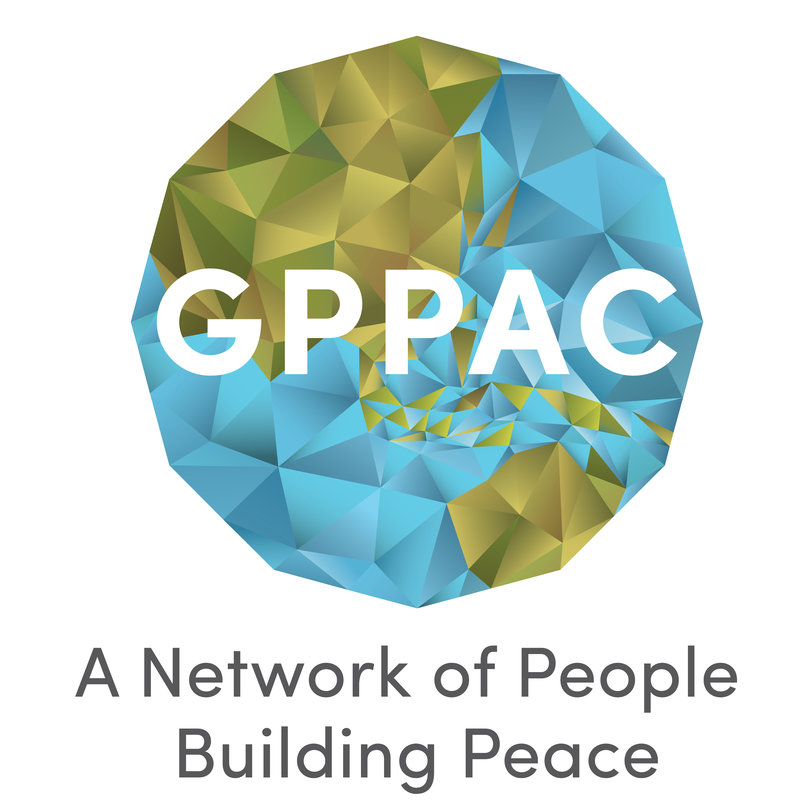 |
 |
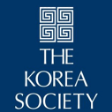 |
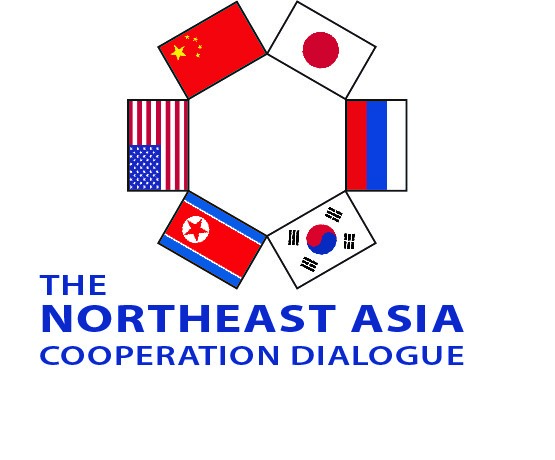 |
 |
 |
 |
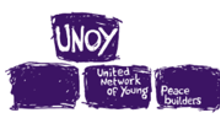 |
ҮТЭҮАХ болон ЮНЕСКО-н Зүүн Хойд Азийн Залуучуудтай хийсэн Виртуал Цуврал Яриа, 2021 оны 7-р сар – 10-р сар.
НҮБ-н Аюулгүйн Зөвлөлийн Энх Тайван ба Аюулгүй Байдал ба Залуучуудын талаар баталсан 2250-р (2015), 2419-р (2018), 2535-р (2020) тогтоолууд нь энх тайван, аюулгүй байдлын үйл явцууд дахь залуучуудын бодит оролцоог дэмжих бүтцийг НҮБ-д олгодог.
Залуучууд амар тайван нийгмийг бий болгож тус тусын амьдардаг газраа үр дүнтэй засаглалыг дэмжих чадалтай. Олон янзын гарал үүсэл бүхий залуучуудыг хуралдуулан ирээдүйн талаар төсөөлөн хэлэлцүүлсэнээр урт удаан нөлөөллийг бий болгон алсын хараатай ярилцлага хийх нөхцөл, итгэлцэл, хамтын ажиллагааг бүрдүүлэх боломжтой юм. Зүйн Хойд Ази дахь Энх Тайван Аюулгүй Байдал ба Залуучуудын мөрийн хөтөлбөрийг дэмжих үүднээс ҮТЭҮАХ-н Ази Номхон Далайн Хэлтэс болон ҮТЭҮАХ-н Инновацийн Нэгж нь ЮНЕСКО ба Хамтарсан Студитай түншлэн соёл хоорондын цуврал хэлэлцүүлгэд мэргэшсэн нийгмийн өөрчлөлтийн компани нь 2021 оны 7-р сарын 28-нд Хятад, Япон, Солонгос, Монгол улсын 45 оролцогчидтой виртуал цуврал хэлэлцүүлгийг өрнүүлсэн. Оролцогчдоос тухайн бүс нутгийн одоогийн нөхцөл байдалтай харьцуулахад ирээдүйн Зүүн Хойд Ази ямар байж болохыг төсөөлөхийг уриалсан. Уг төсөл нь НҮБ-н ирээдүйн мөрийн хөтөлбөрт орох ба Зүүн Хойд Азид Энх Тайван, Аюулгүй Байдал ба Залуучуудыг хэрэгжүүлэхэд хувь нэмэр оруулах юм.
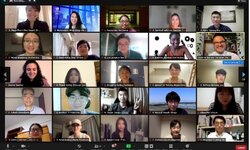

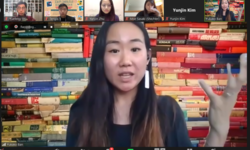

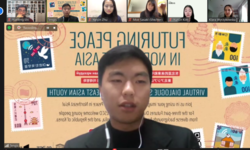
Хоёр дахь хэлэлцүүлэг 10-р сарын 6-нд явагдана. Үүгээр залуучуудын оролцоо, өнгөрсөн болон ирээдүй үе хоорондын харилцаа, цаг уурын өөрчлөлт зэрэг сэдвүүдийг хөндөнө. Хэлэлцүүлгээс гарсан гол үр дүнг ҮТЭҮАХ-н түнш, харилцагчдаар дамжуулан Гишүүн орнуудад танилцуулан залуучуудын талаар ирээдүйд гаргах бодлогын зөвлөмжүүдэд тэднийг илүү сайн оролцуулахын тулд тухайн бүс нутгийн залуучуудын талаарх НҮБ-н мэдлэгийг ерөнхийлөн дүгнэнэ.
Нэмэлт мэдээл:
ҮТЭҮАХ болон Зэвсгээс Ангижрах Асуудал Эрхэлсэн Газрын (ЗААЭГ) Зүүн Хойд Азийн залуучуудын удирдагчиддтай хийсэн цуврлан онлайн сургалтууд, 2020 оны 4-р сар-12-р сар
НҮБ-н Аюулгүйн Зөвлөлийн Энх Тайван ба Аюулгүй Байдал ба Залуучуудын талаар баталсан 2250-р (2015), 2419-р (2018), 2535-р (2020) тогтоолууд нь энх тайван, аюулгүй байдлын үйл явцууд дахь залуучуудын бодит оролцоог дэмжих бүтцийг НҮБ-д олгодог. 2019 оны 10-р сарын 21-нд Бүгд Найрамдах Солонгос Улсын өргөн барьж Япон, Хятад, Монгол зэрэг 84 Гишүүн Орны хамтран дэмжсэн “Залуучууд, зэвсэггүйжүүлэлт ба үл дэлгэрүүлэх” тухай 74/64-р тогтоолыг НҮБ-н Ерөнхий Ассамблей баталсан нь тухайн бүс нутгийн залуучуудад итгэл төрүүлэн олон талт бодлогыг бүрдүүлэх анхны алхам тавигдсан юм.
2020 онд ҮТЭҮАХ болон НҮБ-н Зэвсгээс Ангижрах Асуудал Эрхэлсэн Газар (ЗААЭГ) нь Зүүн Хойд Азийн залуу удирдагчдыг цуглуулан зэвсгээс ангижрах болон үл дэлгэрүүлэх асуудлуудын талаар ярилцах хамтарсан төслийг эхлүүлсэн. 4-р сараас хойш энэхүү хамтын баг нь БНСУ, Япон, Хятад, Монголын найман залуу удирдагчидтай ажиллан зэвсгээс ангижрах, үл дэлгэрүүлэх, хүйс, шинэ технологи, иргэний нийгмийн арга хэмжээн дээр тэднийг сурган чадавхжуулсан. Оролцогчид НҮБ-н албаныхан, хөндлөнгийн мэргэжилтнүүд, академич болон иргэний нийгмийн төлөөлөгчидтэй виртуал цуврал хэлэлцүүлэгт оролцсон.
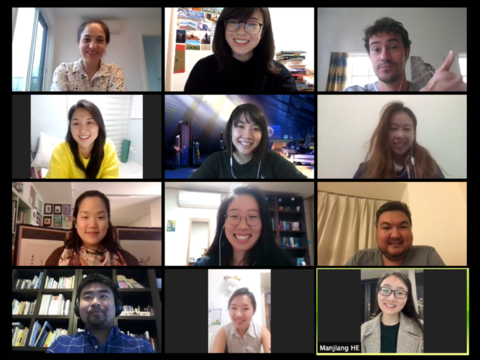
Уг төсөл нь мөн залуучуудыг тухайн бүс нутгийн ахмад бодлого гаргагчидтай холбож ажилласан. Шийдвэр гаргагч болон залуучуудын хоорондын харилцааг бий болгох зорилгын дагуу Зэвсгээс Ангижрах болон Үл Дэлгэрүүлэх Асуудлууд дээрх БНСУ-НҮБ-н жилийн Хамтарсан Бага Хурлын хүрээнд анх удаа 12-р сарын 2-нд залуучуудын тусгай хурал явагдахад төслийн нэгэн оролцогч үг хэлсэн. Тус бүлгийн гишүүд мөн ЗААЭГ-н Өнөөдөр Зэвсгээс Ангижрах подкастын нэг нэвтрүүлэгт оролцон ҮТЭҮАХ-н Улс Төрийн Ярианд өөрсдийн туршлагынхаа талаар нийтлэл бичсэн.

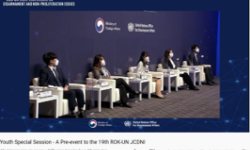
Зүүн Хойд Азийн ҮТЭҮАХ-н залуу удирдагчдын талаар илүү ихийг мэдэхийг хүсвэл төсөл болон оролцогчдын талаарх постыг энд дарж уншина уу.
Залуу удирдагчдын бодлого болон тэдний үзэл бодлын нийтлэлийн холбоос:
Санамж: Эдгээр бодлогын нийтлэлүүдийг бүс нутгийн төслийн үед боловсруулсан ба зөвхөн тухайн нийтлэгч нарын үзлийг тусгасан болно. Тэдний үзэл нь Нэгдсэн Үндэсний Байгууллага болон Гишүүн Орнуудын албан ёсны байр суурийг илэрхийлж байгаа болон тэдний дэмжлэгийг авсан гэсэн үг биш юм.
2019 оны 12-р сарын 10, БНХАУ, Бээжин
ҮТЭҮАХ нь НҮБ-н Эмэгтэйчүүд ба Стокгольмын Олон Улсын Энхийн Судалгааны Институттай (СОУЭСИ) хамтран Энх Тайван, Аюулгүй Байдал ба Эмэгтэйчүүдийн мөрийн хөтөлбөрт Зүүн Хойд Азийн орнуудын хувь нэмрийн талаар бүс нутгийн мэргэжилтнүүдийн хэлэлцүүлгийг зохион байгуулсан. 12-р сарын 10-нд Бээжинд явагдсан уг арга хэмжээнд Хятад, Япон, Монгол, БНСУ зэрэг орны 30 гаруй оролцогчид цугларан Бээжин +25 процессийн 2020 оны ой ба НҮБ-н Аюулгүйн Зөвлөлийн 1325-р Тогтоолын 20 жилийн ойн хүрээнд тус бүс нутагт Энх Тайван, Аюулгүй Байдал ба Эмэгтэйчүүд (ЭТАБЭ) хөтөлбөрийн хэрэгжилтийн явцыг хэлэлцсэн. Тус арга хэмжээн дээр СОУЭСИ нь ЭТАБЭ дахь БНСУ болон Японы өсөн нэмэгдэж буй үүргийн талаарх нийтлэлээ танилцуулсан. Бээжинд болсон зөвлөлдөх хурал нь бүс нутгийн холбоо сүлжээг бататгах боломж олгон тус бүс нутгийн мэргэжилтнүүдэд тулгарч буй асуудлуудыг хэлэлцэн нэг нэгэндээ сайн дадлуудыг хуваалцах боломжийг олгосон юм.
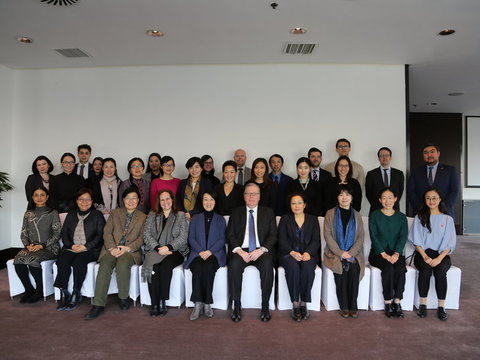
Энх Тайван Аюулгүй Байдал ба Эмэгтэйчүүд: Зүүн Хойд Азийн Дуу Хоолой-н холбоосыг харна үү (2011 оны 3-р сар).
2019 оны 9-р сарын 28, АНУ, Нью Йорк
2019 оны Солонгос дээрх Дэлхийн Энх Тайвны Форумд мэндчилгээ дэвшүүлж байгаадаа таатай байна. Өнгөрсөн жил Солонгосын Хойгт маш чухал үйл явдлууд өрнөлөө. Дээд хэмжээний уулзалтууд зохиогдон салсан гэр бүлүүд эргэн уулзлаа. Мөн олон зорилтуудыг дэвшүүллээ. Өнөөдөр олон улс яриа хэлэлцээрийг үргэлжлүүлэн ахиц дэвшил гаргахыг хүсч байна.
Нэгдсэн Үндэсний Байгууллага нь хоёр Солонгост хамтын ажиллагаа, энх тайвны зурвасуудыг илгээх тавцан болж байгаад миний бие сэтгэл хангалуун байна. Сүүлийн 12 сар Панмунжом Тунхаглалыг Ерөнхий Ассамблей болон Аюулгүйн Зөвлөлийн албан ёсны баримт бичиг болгон тараасан; Хоёр Солонгосын хамтын хүсэлтээр Солонгосын уламжлалт бөхийн барилдааныг Соёлын Биет Бус Өвд бүртгэсэн ба Женевийн Нэгдсэн Үндэсний Байгууллагын Оффис дээр Дэлхийн Таеквондо болон Олон Улсын Таеквондогийн Холбоо нь энх тайвныг уриалсан. Эдгээр бэлгэдлийн алхамууд нь маш чухал юм. Үүнийгээ цааш үргэлжлүүлэх хэрэгтэй. Ерөнхий Нарийн Бичгийн Дарга нь Бүгд Найрамдах Ардчилсан Солонгос Ард Улс болон Америкийн Нэгдсэн Улсын хоёр удирдагчдын 6-р сард хэлэлцэж тохиролцсоноор БНАСАУ-г ажлын түвшний яриа хэлэлцээрийг эхлүүлж хоёр Солонгосын хэлэлцүүлгийг үргэлжлүүлэхийг уриалсаар байна. Бүгд Найрамдах Ардчилсан Солонгос Ард Улс, Бүгд Найрамдах Солонгос Улс болон Америкийн Нэгдсэн Улсын удирдагчдын хооронд дээд хэмжээний уулзалт хийх нь чухал алхам юм.
Тэд Солонгосын Хойгт Аюулгүйн Зөвлөлийн холбогдох тогтоолуудын дагуу тогтвортой энх тайванг бий болгон, цөмийн зэвсгээс бүрмөсөн баталгаатай байдлаар ангижрах явдлыг хэрэгжүүлэхэд тохиромжтой уур амьсгалыг бүрдүүлээд байна. Саад бэрхшээлүүд тулгарч болох ч гол асуудлуудад бодитой ахиц гаргах үндэс суурь тавигдлаа. Нэгдсэн Үндэсний Байгууллагын систем болон Сайн Алба нь талуудын дипломат үйл ажиллагаануудыг дэмжих боломжтой. Та бүгдийн цаашдын яриа хэлэлцээрт амжилт хүсэхийн ялдамд үр дүн өндөртэй форум болно гэдэгт найдаж байна. Баярлалаа.
2019 оны 6-р сарын 3-4, Монгол улс, Улаанбаатар хот
Энхийн хэлэлцээр тохиролцоо зэрэг энх тайван, аюулгүй байдлын асуудлуудыг хэлэлцэхэд залуучуудын оролцоо зайлшгүй шаардлагатай нь мэдээжийн зүйл юм. 2019 оны 6-р сарын 3, 4-нд Монгол Улсын Гадаад Харилцааны Яамтай хамтран Монгол улсын НҮБ-н баг, НҮБ-н Хөгжлийн Хөтөлбөр (НҮБХХ) болон НҮБ-н Залуу Энхийг Сахиулагчдын Нэгдсэн Сүлжээ (ЗЭСНС) нь Зүүн Хойд Азийн бүх хэсгээс залуучуудыг цуглуулж тухайн бүс нутгийн ярианд залуучууд, энх тайван, аюулгүй байдлын хэлэлцэх асуудлууд, үзэл бодлуудыг хэлэлцүүлүүлсэн. Монгол улсын НҮБ-н Залуучуудын Зөвлөх Хэсгийн Зохион байгуулагч асан Хишигжаргал Энхбаяр өөрийнхөө туршлагыг энд бичсэн. Уг семинарыг 2020 оны 3-р сарын 2-нд нийтлэгдсэн Энх тайван, аюулгүй байдал ба залуучуудын талаарх Ерөнхий Нарийн Бичгийн Даргын анхны тайлан-д дурьджээ.
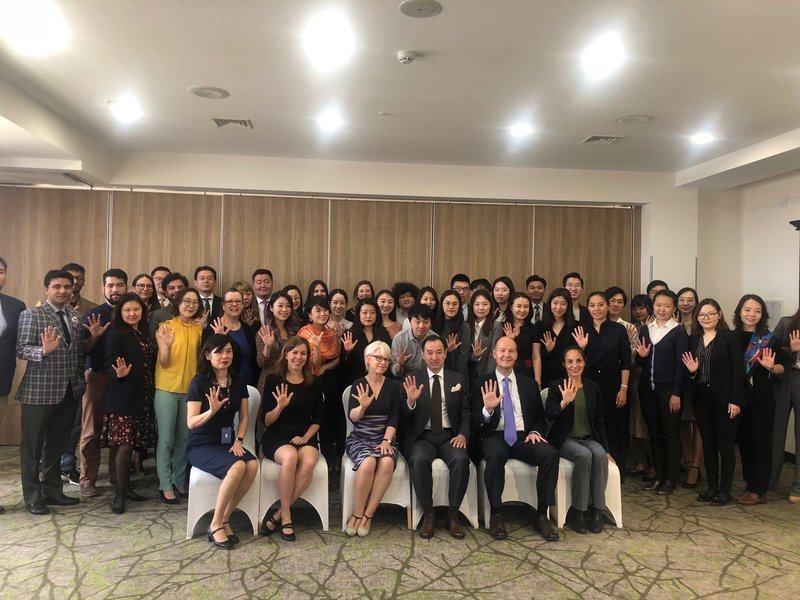
北東アジア: 北東アジアは世界の人口の5分の1を占め、世界の国内総生産の4分の1を占めています。この地域は、歴史的および地域的な紛争に苦しみ続けています。政治平和構築局は、紛争の平和的管理と解決を提唱し、北東アジア諸国がそれらの調整と協力を拡大することを奨励しています。
朝鮮半島。朝鮮半島情勢は、国連が最も長い間抱えている問題の一つです。 1993年、安保理は朝鮮民主主義人民共和国に対し、核兵器不拡散条約から脱退しないよう求め、朝鮮民主主義人民共和国の核問題に関する決議を初めて採択しました。 DPPAの目的は、朝鮮半島における未解決の問題を平和的かつ交渉によって解決するための努力を促進することに貢献することであり、持続可能な平和と完全かつ検証可能な非核化のために当事者が信頼醸成、緊張緩和、対話支援の努力を強化することに重点を置いています。
DPPAの存在と活動: DPPAは、グローバルレベルでの紛争の予防と解決に向けた国連の取り組みにおいて事務総長を支援する主導的な機関であり、「女性、平和、安全(WPS)」や「若者、平和、安全(WPS)」に関する課題を推進するためにUN女性やその他の団体と積極的に連携しています。 DPPAのニューヨークのアジア太平洋部門と北京の連絡拠点は、上海協力機構と交流し、他の国連機関との共同作業の精神に基づき、安全保障理事会へのブリーフィングを準備し、政治分析を行い、事務総長の善処と予防外交の努力を支え、能力開発を行い、他の機関とのパートナーシップを構築しています。
DPPAの北東アジア協力支援プログラムにより、国連システムは特に以下のことを行うことができます。(i) 国連フォーラムへの地域代表の参加を促進 (ii) 国連とDPPAの関与とパートナーシップを支援 (iii) 北東アジアにおける、および北東アジアに関する国連のイニシアティブを促進 (iv) 国連一貫性に貢献。 DPPAの安全保障理事会担当部局は、安全保障理事会の機能と、決議1718(2006)に従って設置された安全保障理事会委員会を含むその補助機関の業務を支援しています。
予防に関する事務総長のビジョンにあるように、「国連は唯一のアクターではなく、多くの場合、最も重要なアクターですらない」のです。 最終的な目標は、我々の権限を拡大することではなく、人々、特に最も弱い立場にある人々のために真の変化をもたらすことです。 普遍的なメンバーシップを持つ多国間主義の象徴として、国連は比類なき招集と動員能力を有しています。 国連システムが最も大きな効果を発揮するのは、他者を真に有効活用するときです。 これは、国連が過去70年にわたって生み出してきた国際規範の守護者としての使命に常に忠実でありながら、最も幅広い政府、地域機関、国際金融機関、市民社会組織、学界、民間部門と有意義なパートナーシップを構築することを意味します。
DPPAは、政府機関、地域・小地域機関のカウンターパート、およびその他の団体と定期的に連絡を取り合っています。この努力は、相互の関心事である地域的または国別の問題についての情報共有と協力を確保することを含め、国連システムを調整するものです。 北東アジアについては、他の組織とのパートナーシップや協力があります。
 |
 |
 |
 |
 |
 |
 |
 |
 |
 |
 |
DPPAとユネスコによる北東アジアの若者との仮想対話シリーズ、2021年7月~10月。
若者、平和、安全保障(YPS)に関する国連安全保障理事会決議2250(2015)、2419(2018)、2535(2020)は、平和と安全のプロセスへの若者の有意義な参加を促進するための国連の枠組みを提供するものです。
若者は、平和な社会を築き、地域社会で効果的なガバナンスを支える可能性を持っています。多様な若者たちが集まって未来を想像することで、永続的な影響を確保し、将来を見据えた対話、信頼、協力のための条件を作り出すことができます。北東アジアにおけるYPSアジェンダの推進に伴い、DPPAアジア太平洋部門とDPPAのイノベーション部門は、ユネスコおよび異文化間対話を専門とする社会変革企業シェアード・スタジオと連携し、2021年7月28日に、中国、日本、韓国、モンゴルから45人が参加した一連の仮想対話を開始しました。参加者は、北東アジアに関する現在の仮定に照らし合わせて、北東アジアの未来を想像するよう求められました。このプロジェクトは、国連の先見性アジェンダに食い込み、北東アジアにおける「若者、平和、安全」アジェンダの実施に貢献することになります。





第2回目のダイアログは10月6日に開催される予定です。 若者の参加、世代間関係、気候変動というトピックが取り上げられる予定です。 ダイアログの主な成果は、DPPAのパートナーやネットワークを通じて加盟国と共有され、地域の若者に関する国連の知識を把握し、彼らの未来に関する政策提言に若者をよりよく取り込むために活用されます。
詳しくはこちら
DPPAとODAによる北東アジアの若手リーダーとのオンライン学習シリーズ、2020年4月~12月
若者、平和、安全保障(YPS)に関する国連安全保障理事会決議2250(2015)、2419(2018)、2535(2020)は、平和と安全のプロセスへの若者のより有意義な参加を促進するための枠組みを提供しています。 2019年10月21日に韓国(ROK)が表決し、日本、中華人民共和国、モンゴルを含む84の加盟国が共同提案した「若者、軍縮、不拡散」に関する決議74/64の国連総会での採択は、地域の若者との多国間政策と信頼醸成イニシアティブのための別の入り口を作り出しました。
2020年、DPPAと国連軍縮部(ODA)は、北東アジアの若手リーダーを集め、軍縮・不拡散問題を議論する共同プロジェクトを開始しました。4月以降、合同チームは韓国、日本、中国、モンゴル出身の8人の青年リーダーを対象に、軍縮、不拡散、ジェンダー、新技術、市民社会活動に関する研修と能力向上を図ってきました。参加者は、国連職員、独立専門家、学者、市民社会代表との一連の仮想討論に参加しました。

また、このプロジェクトは、若者と地域の上級政策立案者を結びつけました。12月2日には、毎年開催されている「軍縮・不拡散問題に関する韓国連合同会議」の一環として初めて開催された青年特別セッションで、プロジェクトの参加者が講演を行い、意思決定者と若者の間の橋渡しをすることに成功した。また、ODAのポッドキャスト「Disarmament Today」の収録や、DPPAの「Politically Speaking」への寄稿を行い、自分たちの経験を振り返りました。


DPPAの北東アジアにおけるユース・チャンピオンについて詳しく知りたい方は、プロジェクトと参加者についてのポスターをこちらからクリックしてください。
若手リーダーたちのポリシーペーパーとその視点に関するリンクはこちらをご覧ください。
注:これらの政策ペーパーは地域プロジェクトの過程で作成されたものであり、著者の見解のみを反映したものです。また、国連やその加盟国の公式見解を必ずしも反映したものではなく、その支持を意味するものでもありません。
2019年12月10日、中国・北京
DPPAは、UN Womenおよびストックホルム国際平和研究所(SIPRI)と緊密に協力し、女性・平和・安全保障(WPS)アジェンダに対する北東アジア諸国の貢献に関する地域専門家会議を開催しました。 12月10日に北京で開催されたこのイベントでは、中国、日本、モンゴル、韓国から30名以上が参加し、北京+25プロセスの2020周年と国連安保理決議1325の20周年を踏まえ、この地域におけるWPS実施の進捗状況について議論しました。 同イベントでSIPRIは、WPSにおける韓国と日本の新たな役割に関する背景文書(background paper)を発表しました。 北京での協議は、地域のネットワークを強化し、地域の専門家が互いの課題を話し合い、ベストプラクティスを共有する機会を提供しました。

リンクをご覧ください。Women, Peace and Security: Voices from Northeast Asia (2021年3月)
2019年9月28日、アメリカ・ニューヨーク
2019年世界平和フォーラム・オン・コリアに、あらためて温かいご挨拶を申しあげます。 昨年は、朝鮮半島に重大な進展がありました。 私たちは首脳会談や家族の再会を目撃しました。そして、多くの公約がなされました。 今日、国際社会は会談の再開と進展を切望しています。
私は、国連が南北朝鮮の協力と平和のメッセージを発信するプラットフォームとなったことをうれしく思ってます。 この12カ月間、板門店宣言が総会と安全保障理事会の公式文書として回覧され、韓国伝統レスリングが両国の共同申請により無形文化遺産に登録され、世界テコンドー連盟と国際テコンドー連盟がジュネーブの国連事務所で平和を推進しました。
こうした象徴的な措置は極めて重要です。 しかし、もっと多くのことが必要です。 事務総長は引き続き、朝鮮民主主義人民共和国に対し、6月に両首脳が合意したとおり、米国との実務者協議を開始し、南北対話を再開するよう促しています。 朝鮮民主主義人民共和国、大韓民国、米国それぞれの首脳が参加した首脳会談は、依然として重要なマイルストーンです。
彼らは、関連する安全保障理事会決議に基づき、朝鮮半島の持続可能な平和と完全かつ検証可能な非核化を推進するための雰囲気を構築してきました。 後退はあり得るが、中核的な問題について具体的な前進を遂げるための基盤ができました。 国連システムと私たちのグッドオフィスは、当事者の外交努力を支援するために利用できます。 私は、今後の議論における皆様の大きな成功を祈るとともに、フォーラムの結果を楽しみにしています。 ありがとうございました。
2019年6月3日から4日まで。, モンゴル・ウランバートル
和平交渉を含め、平和と安全保障の問題を議論する際に、若者を参加させなければならないことは論を待ちません。 2019年6月3日と4日、DPPAはモンゴル外務省、モンゴル国連チーム、国連開発計画(UNDP)、ユナイテッド・ネットワーク・オブ・ヤング・ピースビルダーズ(UNOY)と連携し、北東アジア各地から若者を集め、若者と平和と安全のアジェンダと地域における対話の展望を議論しました。
モンゴルの国連青年諮問委員会の元コーディネーター、ヒシグジャルガル・エンクバヤル氏は、この経験について次のように書いていますこれ。このワークショップは、2020年3月2日に発行された 若者と平和および安全保障に関する事務総長第1次報告書で言及されました。

Despite a steady decrease in grave violations against children in Colombia since the signing of the 2016 Peace Agreement between the Government and FARC rebels, youngsters there continue to suffer from the impact of hostilities, according to a new UN report published on Wednesday.
Seven years into the war in Yemen, UN Special Envoy Hans Grundberg reaffirmed to the Security Council on Wednesday that no long-term solution can be found on the battlefield, urging the warring parties to “talk, even if they are not ready to put down their arms”.
At least four children have been killed and multiple others have been maimed during an escalation of conflict over the past week in Myanmar, said the United Nations Children’s Fund (UNICEF) on Tuesday.
As the death toll from the recent unrest in Kazakhstan mounts to 164, the UN Office for Human Rights (OHCHR) on Tuesday requested “prompt, independent, impartial investigations” into the killings, and whether “unnecessary and disproportionate use of force was made by security forces”.
A decade after civil conflict erupted in Mali, hopes for an early resolution to insurgency and strife have not materialized, the Special Representative of the Secretary-General for the country, El-Ghassim Wane, told the Security Council on Tuesday.
The use of explosives that lie dormant, particularly in populated areas, is “a persistent and growing threat to children and their families”, the UN Children’s Fund (UNICEF) said on Tuesday, expressing deep sadness over the death of eight students in Nangarhar Province, Afghanistan.
Amid record global displacement, the UN refugee agency, UNHCR, on Monday urged European countries to prioritize the better protection of people fleeing war, conflict and persecution.
The Secretary-General, António Guterres, strongly condemned on Monday the “appalling” attacks perpetrated over the weekend in Nigeria’s Zamfara State in which scores of civilians were killed.
After a recent wave of attempts and coups d'état in Central African Republic, Mali, Sudan and Guinea, The UN Special Representative for the region told the Security Council on Monday this resurgence, particularly in West Africa, “is often the consequence of political practices that are completely out of step with the aspirations of the populations.”
Recent airstrikes on camps for internally displaced persons and refugees in Tigray, northern Ethiopia, have reportedly killed scores of civilians, including children, and left many more injured.
The Secretary-General, António Guterres, said on Monday he was deeply saddened by reports that more than 50 civilians were killed and injured in an airstrike in northern Ethiopia, last Friday.
Although everyone has been deeply affected by the COVID-19 pandemic, the impact on young people has been “especially heartbreaking”, UN Secretary-General António Guterres said on Monday.
UN Public Information Officer Brenden Varma recently returned from a six-month stint in Iraq, where he helped to promote participation in national elections. His experience opened his eyes to the complexities of life in the country.
Hopes that the tourism industry would rebound from the devastating effects of the COVID-19 pandemic have been dented by the wildfire spread of the Omicron variant. In an exclusive interview with UN News, Zoritsa Urosevic, Executive Director of the UN World Tourism Organization (UNWTO), called for new ideas to restart the sector.
|
|
|
|
|
|
The Ethiopian Government on Friday freed several high-profile political detainees, a move UN Secretary-General António Guterres hailed as a “significant confidence-building step”.
동북아시아: 이 지역은 전 세계 인구의 5분의 1을 차지하고 있으며, 세계 국내 총생산의 4분의 1을 담당하고 있습니다. 여전히 역사 문제와 영토 분쟁으로 긴장 상태에 있는 지역으로, 정무평화구축국(Department of Political and Peacebuilding Affairs)은 분쟁이 평화적으로 해결되어야 하는 점을 강조하고 동북아시아 국가들 사이의 협력 강화를 지지합니다.
한반도: 한반도 문제는 유엔에서 가장 오랫동안 다룬 문제 중 하나입니다. 유엔 안전보장이사회(안보리)는 1993년 조선민주주의 인민공화국(북한)이 핵무기비확산조약을 철회하지 말 것을 강조하며, 북핵 문제 관련 첫 결의안을 채택했습니다. 정무평화구축국의 목표는 지속 가능한 평화와 검증 가능한 비핵화를 위한 당사국들의 신뢰 구축, 긴장 완화, 대화 지원 등의 도움을 확대해 한반도의 문제를 평화적으로 해결할 수 있도록 기여하는 것입니다.
정무평화구축국 활동: 본 국은 유엔 사무총장의 분쟁예방 활동을 지원하는 중심 부서입니다. 또한, “청소년, 평화 및 안전”(Youth, Peace and Security)과 “여성과 평화 안보”(Women, Peace and Security) 의제들을 발전시키기 위해 유엔 여성기구(UN Women) 및 여러 단체들과 함께 협력하고 있습니다. 뉴욕 유엔본부에 위치한 정무평화구축국의 아시아태평양부(Asia and the Pacific Division)는 북경 연락담당처(Liaison Presence in Beijing) 및 상하이 협력 기구(Shanghai Cooperation Organisation)와 함께 외교 노력을 지원하고 있습니다. 그 외에 다른 단체들과 파트너십을 지속하며 국제정세 분석 및 유엔 사무총장의 예방외교(preventive diplomacy) 노력을 지원하고 있습니다.
동북아시아 협력지원 프로그램(DPPA Programme to Support Cooperation)을 통해: (i) 동북아시아 지역 대표들의 유엔 및 관련 회의 참석 지원; (ii) 유엔 및 정무평화구축국의 파트너쉽과 협력을 지원; (iii) 동북아시아 관련 유엔 활동들을 추진; (iv) 유엔 활동의 일관성에 기여하고 있습니다. 정무평화구축국의 안전보장이사회부(Security Council Affairs Division)는 안보리 및 보조기관들의 원활한 활동을 지원하고 있습니다.
유엔 사무총장의 예방 관련 비전에 따르면 유엔의 목표는 취약한 인구들을 위해 변화를 만드는데 도움을 주는 것 입니다. 다자주의의 중심에 있는 유엔은 이사국들을 소집하고 동원할 수 있는 힘을 가지고 있으며, 여려 정부, 지역단체, 국제금융기구 및 시민사회, 학계 또는 민간부분들과의 의미있고 중요한 협력을 강화 시켜나가는데 가장 큰 기여와 영향력을 행사 합니다.
이 목표에 성취하기 위하여 정무평화구축국은 정부 및 지역단체, 다른 독립체들과 주기적인 접촉을 통해 정보공유와 협력 관련 파트너쉽을 추구 하고 있습니다:
 |
 |
 |
 |
 |
 |
 |
 |
 |
 |
 |
동북아시아 청소년들과의 온라인 대화 시리즈(정무평화구축국-유네스코 공동회의), 2021년 7월-10월
“청소년, 평화 및 안보” (Youth, Peace and Security) 의제를 다루는 유엔 안전보장이사회 결의안 2250 (2015), 2419 (2018), 2535 (2020)에 기반해 정무평화구축국 아시아태평양부는 유네스코, 사회변화기업 Shared Studio와 "동북아시아의 미래포럼"을 진행하였습니다. 청소년들에게는 자신들의 사회가 평화로울수 있게 돕는 능력의 잠재력이 있기에, 다양한 배경에서 생활하는 청소년들을 모아 자신들이 추구하는 평화로운 미래사회는 어떤 형태인지 대화를 나눌수 있는 기회를 제공함으로써 안전한 미래 및 신뢰, 협력 구축을 향해 긍정적인 영향을 주고자 하였습니다. 2021년 7월부터 10월까지 진행된 대화 시리즈를 통해 중국, 일본, 한국 및 몽골리아에서 총 45명의 청소년들이 참석해 동북아시아 지역에 대한 자신들의 현재 편견들과 평화로운 미래를 그리는 대화를 나누었습니다. 이 회의를 계기로 회원국들에게 청소년들의 유엔 관련 지식을 알리고 청소년 관련 미래 정책제안에 청소년들을 포함시킬 기회 역시 만들 수 있었습니다.





회의의 하이라이트는 정무평화구축국 매거진 Politically Speaking을 통해 공유 되었습니다.
더 많은 정보:
https://futuringpeace.org/NEA/
https://en.unesco.org/futuresliteracy
https://twitter.com/UNDPPA/status/1420411383406112771
https://dppa.medium.com/creating-a-collective-language-youth-from-northeast-asia-imagine-the-future-of-the-region-97e411135a7d
유엔 정무평화구축국과 군축실(Office of Disarmament Affairs)이 공동개최한 동북아시아 청소년 리더와 함께 하는 온라인 교육 시리즈, 2020년 4월 - 12월
유엔 안전보장이사회 결의안 2250 (2015), 2419 (2018) 및 2535 (2020)은 “청소년, 평화 및 안전” (Youth, Peace and Security) 의제 관련해 청소년들이 평화와 안보 협상에 의미있는 참여를 할 수 있게 유엔이 체제적인 도움을 제공하는 바탕이 됩니다. 한국의 주도로 2019년 10월 21일에 채택 된 총회 결의안 74/64 (“청소년, 군축과 비확산”)은 중국, 일본, 몽골리아 를 포함한 84 개의 회원국들이 지지하였고, 이 계기로 청소년들이 다자정책 및 신뢰구축 관련 활동에 더 적극적으로 참여 할 수 있었습니다.
2020년엔 정무평화구축국과 군축실이 동북아시아의 청소년 리더들을 집합해 군축 및 핵확산금지 주제로 대화를 할 수 있는 본 프로젝트를 함께 시작하였습니다. 2020년 4월부터는 한국, 일본, 중국 및 몽골리아의 대표 청소년 8명과 함께 군축, 핵확산금지, 성평등, 신기술 및 시민사회 활동에 대해 교육을 제공하였으며, 유엔 관계자, 독립전문가, 학계 및 시민사회 대표들과 마련된 온라인대화를 통해 참가자 들에 군축 및 핵확산금지에 대해서 배워가는 기회를 제공 하였습니다.

이 프로젝트를 통해 12월 2일에 최초로 개최 된 한-유엔 군축·비확산 회의에서는 청소년들이 고위급 정책입안자들과 대화를 나눌 수 있는 기회도 있었습니다. 프로젝트의 참가자 중 한명은 특별청소년세션에 참석해 발언을 하였고, 정무평화구축국국 매거진 Politically Speaking과 군축실 팟캐스트 Disarmament Today에 경험을 나눌수 있었습니다.


동북아시아 청소년 관련 정책서와 관점에 대해 더 알아보기 원하시면 아래 링크를 확인하여 주세요.
알림: 본 정책서는 지역 프로젝트의 과정에서 만들어진 저자의 개인 소견을 반영한 글이며, 유엔 및 이사국들의 공식적인 입장은 아닙니다.
2019년 12월 10일, 중국 북경
정무평화구축국은 유엔 여성기구(UN Women)와 스톡홀름국제평화연구소(SIPRI)와 함께 지역 전문가들을 초청해 여성, 평화 안보 의제 관련 동북아시아의 역활을 논하였습니다. 2019년 12월 10일에 개최 된 본 회의에서 중국, 일본, 한국, 및 몽골리아에서 총 30명의 참가자들은 동북아시아 내 여성, 평화 안보 의제가 어떻게 시행되고 있는지에 대해 대화를 나누었습니다. 스톡홀름국제평화연구소는 여성, 평화 안보를 위해 이바지하는 한국과 일본의 선두적인 역활을 연구 한 보고서를 발표 하였고, 본 회의를 통하여 지역 전문가들이 서로의 경험 및 배울 점을 공유할 수 있었고, 동북아시아 여성 네트워크가 더 강화되는 계기가 되었습니다.

여성, 평화 안보: 동북아시아의 목소리 (2021년 3월)
2019년 9월 28일, 미국 뉴욕
2019년 한반도 국제평화포럼에 다시 인사드리게 되어 기쁩니다. 작년에 한반도는 중대한 발전을 경험하였습니다. 우리는 정상회담 외 이산 가족 상봉을 목격했습니다. 그리고 많은 약속들이 있었습니다. 현재 국제 사회는 한반도 관련 대화가 재개되길 바라고 있습니다. 유엔은 남북간 협력 및 평화 메시지 전달의 연결고리가 되었고, 그 점을 기쁘게 생각합니다. 지난 일년간 판문점 선언은 유엔 총회 및 안전보장이사회의 공식 문서로 배포되었고, 남북의 공동 신청을 통하여 씨름이 세계무형유산에 등록 되었으며, 태권도를 통하여 유엔 제네바 사무국에서 평화를 촉진시키는 기회가 있었습니다. 이러한 상징적인 단계는 중요합니다. 그리고 여기서 멈춰서는 안 됩니다. 유엔 사무총장은 계속해서 6월에 미국과 북한의 약속에 따라 실무 회담을 빠른 시일에 시작하고, 남북 대화를 재개할 것을 지지하고 있습니다. 남북 및 미국 정상회담은 중요한 단계로 남아있습니다. 안전보장이사회 결의안들을 통하여 증명 가능하고 돌이킬 수 없는 비핵화 및 한반도의 지속가능한 평화를 위해 분위기는 만들어졌습니다. 어려움이 있을 수는 있지만, 핵심 문제에 대해 명백한 성과를 이룰 수 있게 기반이 준비 되어 있습니다. 유엔과 사무총장의 중재사무소 (Good Offices)는 분쟁 당사자들의 외교적인 노력을 도울 준비가 되어있습니다. 앞으로 있을 논의에 훌륭한 성과가 있길 바라고 포럼의 결과를 기대하겠습니다. 감사합니다.
2019년 6월 3- 4일, 몽골 울란바토르
청소년들이 평화 협상 등 평화 및 안보 문제에 포함되어야 한다는 것은 의문의 여지가 없습니다. 2019년 6월 3-4일, 정무평화구축국은 몽골리아 외교부 및 몽골리아 유엔사무소 관계자들, 유엔 개발 계획 (United Nations Development Programme)과 청년 평화 구축자 연합 네트워크 (United Network of Young Peacebuilders)와 함께 공동 워크숍을 진행하였습니다. 동북아시아 청소년 참가자들은 워크숍에 참석해 “청소년, 평화 및 안전” 의제에 대해 대화를 나누었습니다.
유엔 청소년 자문 패널 전 담당자의 경험을 여기에서 확인하세요. 이 워크숍은 2020년 3월 1일에 발행된 “청소년, 평화 및 안전” 의 첫 사무총장 보고서에 언급되었습니다.

The UN is urging authorities in Lebanon to conduct a quick and thorough investigation into an attack earlier this week against peacekeepers maintaining security and stability in the south of the country.
“Refugees are not and should never be a target”, UN High Commissioner for Refugees Filippo Grandi said on Thursday, following reports of a deadly airstrike on the Mai Aini refugee camp in Tigray, northern Ethiopia.
Syria’s declaration of its chemical weapons programme cannot be considered accurate due to gaps, inconsistencies and discrepancies, the High Representative for Disarmament Affairs told the Security Council on Wednesday.
Authorities in Myanmar are being urged to conduct a full investigation into the killing of a journalist last month, reportedly during an army attack in the southeast, the UN’s educational and cultural agency, UNESCO, said on Wednesday.
Warring parties should never attack children or the services they rely on, a senior official with the UN children’s agency, UNICEF, said on Tuesday, following recent violence and disruption in Syria.
The Special Representative of the Secretary-General for Sudan, Volker Perthes, expressed on Monday his regret over Prime Minister Abdalla Hamdok’s decision to step down.
The United Nations’ Secretary-General condemned on Monday the continued violence targeting protestors in Sudan, following the 25 October military takeover.